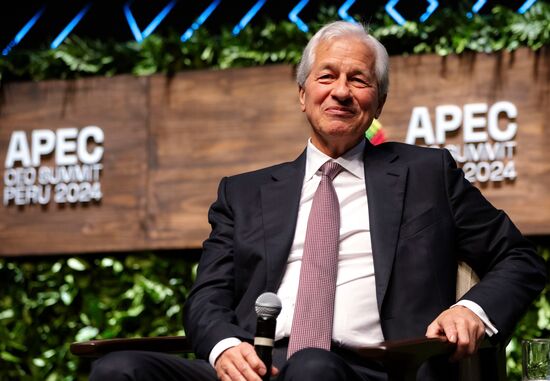| Bloomberg Evening Briefing Americas |
| |
| "The economy is not sending any signals that we need to be in a hurry to lower rates," Federal Reserve Chair Jerome Powell said Thursday during a speech in Dallas. Unsurprisingly, this sentiment wasn't welcomed by traders on Wall Street eager for a more aggressive approach to interest rates. The S&P 500 hit session lows, Treasury two-year yields spiked and the dollar rose after Powell's remarks. Finance professionals have counted on deeper rate cuts in coming Fed meetings, but inflation ticked up Wednesday and producer prices came in higher than expected on Thursday. Traders dialed back bets on a December rate cut to a little over 55% from roughly 80% in the previous session. While Powell has been clear there's no linear path to 2% inflation, monetary policy could face wind shear if Donald Trump fulfills his promise to get the new Republican-controlled Congress to cut taxes, pushes out millions of immigrants and deploys tariffs. Policy uncertainty, it would seem, is likely contributing to the Fed's more inertial attitude toward lowering rates. Here's your markets wrap. —Margaret Sutherlin | |
| Automaker stocks fell Thursday after Reuters reported Trump is planning to propose Congress kill a $7,500 consumer tax credit for electric cars (this despite his new right-hand man being Tesla co-founder Elon Musk) as part of a promised attack on efforts to cut fossil fuel use. Rivian shares slid 11% and Ford and GM pared earlier gains. Tesla fell nearly 5%, though Reuters says Musk doesn't mind because killing the credit will damage his rivals. The credit is a signature element of President Joe Biden's Inflation Reduction Act, which poured billions of dollars into supporting the green transition and on-shoring EV manufacturing. A repeal—which would have to be passed by Congress—would complicate the already bumpy transition away from gas-burning cars. Automakers have pared back plans around EVs this year—Ford scrapped an electric SUV and GM is overhauling its battery plans—on consumer demand for hybrids instead.  A Rivian EV Source: Rivian | |
| |
|
| US regulators led by the Fed won't back a plan to push lenders to disclose their climate risk. The Basel Committee on Banking Supervision has already watered down the proposal significantly to accommodate the Fed. Now, the group which sets standards for central banks is bracing for a scenario where the goals of addressing climate change through regulation could be permanently shelved. US ambivalence is in stark contrast to how regulators on the other side of the Atlantic are approaching increasingly catastrophic global warming. The European Central Bank has repeatedly told lenders in the region they face fines unless they meet explicit expectations for handling climate risk. In the US, meanwhile, Powell has called it a "big mistake" to expect bank regulators "to lead the fight on climate change." | |
| |
|
| For the first time ever, US money-market funds have more than $7 trillion in assets under management, a milestone for an industry that's skyrocketed in popularity among investors, thanks to lofty and dependable yields. Even after the Fed cut its benchmark rate by half a point in September and a quarter point this month, they remain popular for their yields. So far this year, more than $700 billion has flooded into the funds according to one estimate. | |
| |
|
| The Middle East's sovereign wealth funds oversee close to $4 trillion of assets, making them key players in global dealmaking. So three big shakeups could reverberate across the financial ecosystem: Qatar named a new chief executive for its $510 billion fund, Kuwait is replacing the head of its $1 trillion state-backed investor, while the Abu Dhabi Investment Authority is in the midst of a strategic shift. | |
| |
|
| |
| |
| |
|
| Green-minded investment funds got their best sales pitch in 2016 when Trump was first elected: If Washington wasn't going to push for a transition, maybe capital markets could. But the landscape has changed. After a stretch of rough performance and Big Oil-Republican led attacks, environmental, social and governance stratgeies are effectively a "dead man walking" in the US. Meanwhile, the US Senate's incoming Republican majority leader is a big fan of an energy source Trump hates. | |
| |
|
| The US Federal Trade Commission is planning to investigate Microsoft's cloud business for anti-competitive business practices. The probe reportedly would scrutinize subscription fees Microsoft asks customers to pay. Under director Lina Kahn, the FTC has toughened merger oversight, done away with noncompete clauses and gone after anticompetitive practices at Amazon and Facebook owner Meta. She's likely to be replaced under the incoming Trump administration, which is expected to reverse course.  Lina Khan Photographer: Al Drago/Bloomberg | |
| |
| |
| |
| |
| Auctions are often judged solely by the buy side. How many bidders were there? And from how many countries? And how high were they willing to go? But on the eve of New York's fall megasales, where Christie's, Sotheby's and Phillips will attempt to sell roughly $1.5 billion worth of art in just one week, there's reason to look to the sellers. Simply put: sellers don't put works up for auction if the market is soft. | |
| |
| |
| Enjoying Evening Briefing Americas? Get more news and analysis with our regional editions for Asia and Europe. Check out these newsletters, too: Explore all newsletters at Bloomberg.com. | |
| |




















No comments:
Post a Comment